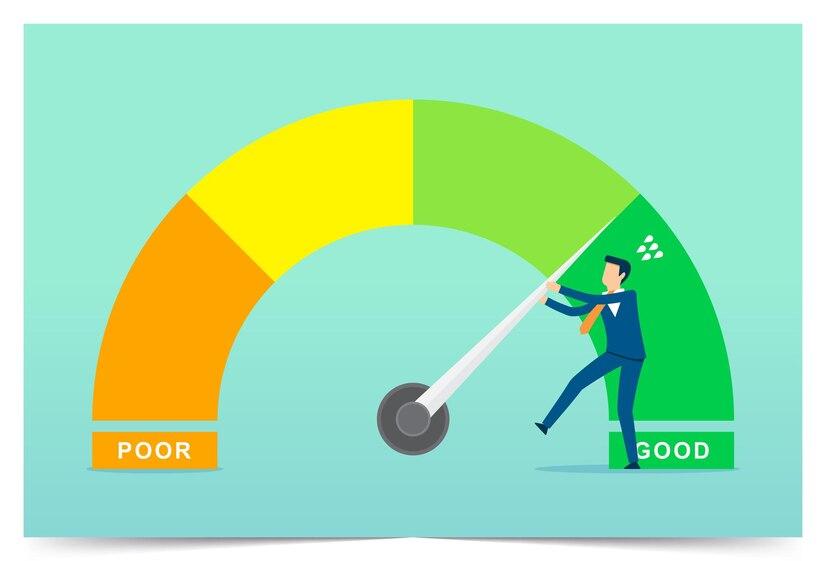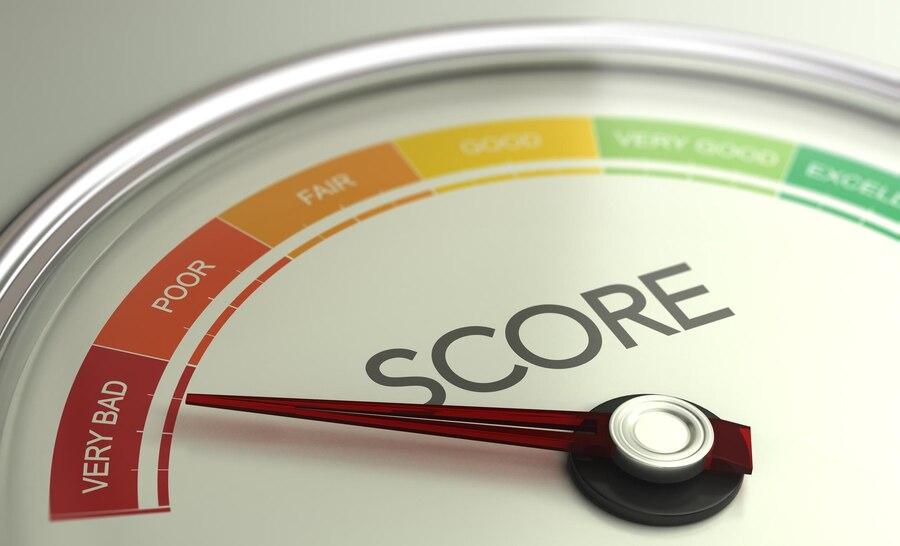

Table of Contents
- What is CIBIL Score?
- How is CIBIL Score Calculated?
- Impact of CIBIL Score on Home Loan Approval
- CIBIL Score Band and What it means for Home Loan Borrowers
- How Do I Check My CIBIL Score Through CIBIL?
- Can I get a Home Loan with low CIBIL Score or No Credit History?
- Tips on How To Have A Good CIBIL Score?
- Conclusion
- Faq's
For most homebuyers, buying a home requires the assistance of home loans to finance their purchase. In India, homebuyers have to pay 10% of the entire cost of the house as a downpayment and the rest 90% can be paid with the help of home loans.
However, securing a home loan requires an individual to be eligible for it and in the Indian financial landscape, a CIBIL score plays a crucial role in determining the eligibility of an individual for various types of loans, including home loans.
This three-digit number, ranging from 300 to 900, is a comprehensive indicator of an individual's creditworthiness and repayment history.
In this article, we will delve into the details of how CIBIL scores are calculated and their significance in the context of home loan approvals.
What is CIBIL Score?
CIBIL stands for Credit Information Bureau India Limited, which is an Indian credit rating bureau that has access to your credit information.
CIBIL's score also known as credit score score is a numerical representation of an individual's credit history, calculated by analysing various factors such as payment history, credit utilization, credit length, credit mix, and recent credit inquiries.
This score is used by lenders to assess the risk associated with lending to a particular individual. A higher CIBIL score indicates a better credit history and a lower risk for the lender, while a lower score suggests a higher risk.

How is CIBIL Score Calculated?
The CIBIL score is calculated based on the information contained in the Credit Information Report (CIR), which includes details of an individual's credit history across various lenders and products. The CIR is maintained by the Credit Information Bureau (India) Limited, also known as
TransUnion CIBIL, and is used to generate the CIBIL score. The score is calculated using a complex algorithm that considers the following factors:
Payment History (30%): This factor assesses the individual's track record of timely payments, including loan and credit card payments. A consistent history of timely payments contributes positively to the score.
Credit Exposure (25%): This factor evaluates the amount of credit extended to the individual and the proportion of credit utilized. Maintaining a low credit utiliaation ratio and avoiding excessive borrowing helps in improving the score.
Credit Type and Duration (25%): This factor considers the types of credit availed by the individual, such as secured and unsecured loans, and the duration of credit usage. A diverse credit mix and a longer credit history contribute positively to the score.
Other Factors (20%): This category includes factors such as the number of credit inquiries, credit utilization, and any outstanding debts. Avoiding excessive inquiries and maintaining a low debt-to-income ratio helps in improving the score.
Also Read: Understanding the Basics of Home Insurance Policies
Impact of CIBIL Score on Home Loan Approval
A good CIBIL score is essential for easy home loan approval. Lenders use the CIBIL score to assess the risk associated with lending to a particular individual. A higher CIBIL score indicates a lower risk and increases the chances of loan approval. Here are some general guidelines on the CIBIL score required for home loan approval:
Ideal Score: A CIBIL score of 750 or above is considered ideal for home loan approval. This score indicates a strong credit history and a low risk for the lender.
Good Score: A score of 700 to 749 is considered good and may still be acceptable for home loan approval, although the interest rates may be slightly higher.
Fair Score: A score of 650 to 699 is considered fair and may require additional documentation or a higher interest rate to compensate for the higher risk.
Poor Score: A score below 650 may make it challenging to secure a home loan, and the individual may need to consider alternative options or work on improving their credit score.
 A good CIBIL score is essential for Home Loan Approval
A good CIBIL score is essential for Home Loan Approval
CIBIL Score Band and What it means for Home Loan Borrowers
CIBIL Score Band | Credit Score Range | Meaning for Home Loan Borrowers |
Excellent | 800 - 900 | Likely to get the best interest rates and terms on home loans. |
Very Good | 750 - 799 | Eligible for competitive interest rates and favorable loan terms. |
Good | 700 - 749 | Qualify for home loans with decent interest rates, but may not get the best deals. |
Fair | 650 - 699 | May face slightly higher interest rates and stricter loan terms. |
Poor | Below 650 | Difficulty in getting approved for a home loan, may require additional collateral or higher interest rates. |
How Do I Check My CIBIL Score Through CIBIL?
To check your CIBIL Score through CIBIL, you can follow these steps:
Step 1: Visit the CIBIL Website: Go to the official TransUnion CIBIL website at www.cibil.com.
Step 2: Log In or Register: If you already have a CIBIL account, log in using your credentials. If not, register for a new account by providing the required details.
Step 3: Once logged in, navigate to your dashboard where you can access various features and tools related to your credit health.
Step 4: Check Your CIBIL Score: On your dashboard, you can check your CIBIL Score and report. This score is a three-digit numeric expression that represents your creditworthiness, ranging from 300 to 900.
Step 5: Monitor Your Credit Health: Regularly checking your CIBIL Score and report helps you stay informed about your credit health and identify any potential issues. This allows you to take proactive steps to improve your creditworthiness and maintain a healthy financial profile.
Also Read: 5 Compelling Reasons Why You Should Buy a Home This Year
Can I get a Home Loan with low CIBIL Score or No Credit History?
 It is possible to get a loan with a low CIBIL Score
It is possible to get a loan with a low CIBIL Score
Yes, it is possible to get a loan with a low CIBIL Score or no credit history. While a good CIBIL Score can increase your chances of loan approval and better interest rates, lenders do offer loans to individuals with low scores or no credit history.
However, the terms and conditions of these loans might be less favorable, such as higher interest rates or stricter repayment terms.
For individuals with no credit history, lenders may consider alternative methods to assess their creditworthiness, such as income verification, employment history, and other financial metrics. This can include applying with a co-applicant or guarantor who has a good credit score, or providing additional collateral to secure the loan.
For those with low CIBIL Scores, lenders may still offer loans, but at higher interest rates or with more stringent requirements. It is crucial to shop around and compare offers from different lenders to find the best deal.
Additionally, improving your credit score over time can lead to better loan options and more favorable terms in the future
Remember that checking your own CIBIL Score does not affect your credit score negatively.
However, if a lender or credit card issuer requests CIBIL to check your credit report, it might lower your score slightly
Tips on How To Have A Good CIBIL Score?
By following the below-mentioned tips, you can easily improve your CIBIL score or continue to maintain your CIBIL score:
- Pay all your dues on time, including loan EMIs and credit card bills. Set up automatic payments to avoid missing deadlines
- Maintain a low credit utilisation ratio, ideally below 30% of your total available credit limit
- Limit the number of new credit applications and loan inquiries, as each one can cause a slight dip in your score
- Build a diverse credit portfolio with a mix of secured (e.g. home loan) and unsecured (e.g. credit cards) loans to demonstrate your ability to handle different types of credit
- Retain old credit accounts to build a longer credit history, as it positively impacts your score
- Monitor your credit report regularly and dispute any errors or discrepancies immediately
- Consolidate your debts into a single loan with a lower interest rate to simplify your finances and improve your credit utilization ratio
- Avoid applying for new credit unless absolutely necessary, as each application can lead to a hard inquiry that temporarily lowers your score
By following these tips consistently, you can maintain a good CIBIL Score, which will improve your chances of getting approved for loans and credit cards at favorable terms.
Conclusion
In conclusion, the significance of the CIBIL score in the context of home loans cannot be overstated. As a comprehensive indicator of an individual's creditworthiness, the CIBIL score plays a pivotal role in determining loan eligibility and interest rates.
Through a thorough understanding of how CIBIL scores are calculated and the factors that influence them, homebuyers can take proactive steps to maintain or improve their credit health.
By paying bills on time, managing credit responsibly, and monitoring their credit report regularly, individuals can enhance their chances of securing a home loan at competitive rates. Ultimately, a good CIBIL score not only facilitates the home loan approval process but also empowers individuals to make informed financial decisions and achieve their homeownership goals with confidence.
explore further
Latest from Home Buying Tips
More from Recommendations
Resources
Dwello, for every home buyer, is a way to go from 'I feel' to 'I know', at no extra cost.


